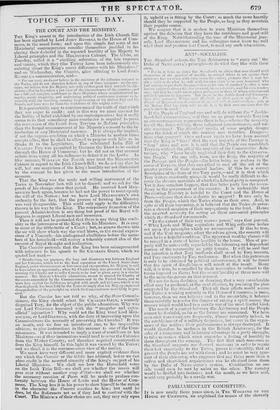ANTI -SOCIALISM.
THE Standard exhorts the Tory Aristocracy to " carry out " the Duke of NEWCASTLE'S principle—to do what they like with their OWn.
" Fr be it from us (says the S(.ineh!rti) to advise that men sliould avail themselves of the accident of wealth, to compel others to act against their opini,:ns; but we reyet with utter scorn the venting pretence that a man has not It :ight to a0 What Inc Win with his own (may be ever honoured who had courage to pot forth the proposition as his rule of conduct !)—that a man has not a right to edmo-e I. is owe, st'errtrel, leis own te2;:ilvis, and his own trades- deep ; awl tbat he wzglit flat to give a preerence to those of whose religious and political opinions lie approves. But pe;lee to the double-faced doll onserva-
WI:(1 .1.,/t/MtiZt. 1 t 1 i!;s 0 1 #1 lla,!ir:ils lit their pi irate tur,irs. The Polll,o Eufel,to I eget elo r•r,T. .,;.;1! trilleml thew ; and, as Roliert Peel has fairly told us all, it is by their own exertions that the peo;le are Cu, be saved."
If the People of nu:land can and will do without the " double- faced dull Conservatives,"—if they are as prone towards Toryism as our contempt:err represents them to be,—whence the necessity for all this fierce writing., these indignant remonstrances, and ter- rific warnings? The Standard speaks of some mighty danger upon the brink of' ‘oltiell the country now trembles. Damps— from what quarter ? Over and over ogain we have been assured thet the King is " firm:" that the vast majority of the Peerage is " firm " also; and now it is said that the People can reestablish Toryism without the aid of the majority of the Conservative Ads- tocracv, who " have basely neglected their duty to the Conserva- tive People." On one side, then, are the King, the majority of the Peemee. and the People—the latter being so zealous in the cause of Toryinn, that they can all'ord to cast Off the aid of the greater portion of their nominal leaders. If this be a correct description of the force of the Tory party,—and it is that which Tory writers constantly give,—it would be really difficult to dis- cover the ole,eure materials of which the Liberal party is composed. Yet it does somehow happen, that this latter party has the ascen- dancy in the government of the country. It is undeniable that the existing Ministry is hateful to the Court and the House of Peers—whence then does it derive its support? It can only be from the People, which the Tories claim as their own. And, in spite of all their vapouring, it is believed that the Tories do enter- tain a shrewd suspicion of their unpopularity in the land. Hence the asserted neeessity for acting on these anti-social principles which the Standard recommends.
"To the extent of their very narrow power," says that journal, " Whig Lords and Whig capitalists and Whig collective bodies act upon the principles which we recommend." If this be true, and if the Tory magnates adopt the advice given, the country will soon be in a hopeful condition. The upper and wealthy classes will be ransed in a state of bitter hostility to the lower. Men of pro- perty will be universally regarded by the labouring and dependent portion of the community as uetty tyrants. It r ill be said that the intention is that Tory landlords shall stand by Tory tenants, and Tory customers by Tory tradesmen. But when this patronage is only to be obtained by political subserviency, it will be found that the spirit of Englishmen will revolt at the insult. Many will, it is true, be compelled by their necessities to submit to the terms imposed on them ; but the seeret hostility of these men will be the more dangerous on that account.
We are far from donbting or denying, that a very considerable effect may he produced, at the next election, by pursuing the plan suggested by the Standard. That all their efforts would secure the Tories a working majority in the House of Commons, is more, however, than we can belicre; and in the meanwhile, it behoves them carefully to ponder the danger of raising a spirit among the masses which would lead to a servile war of the most fearful kind.
The result of' a contest between the Aristocracy and the People cannot be doubtful, as fir as the former are concerned. We have seen civil wars terminate frequently, almost invariably indeed, in the establishment of a military despotism, but eever in the supre- macy of the nobles : their predominance is always destroyed. It would therefore be madness in the British Aristocracy, for the sake of a temporary awl indecisive advantage in a party struggle, to take msasnres which must engender a feeling of hostility to them throughout the country. The fact that such measures as the Standard suea.rests ate deemed necessary in order to regain their lost superiority to the Tories, proves ineontestibly, that at present the People are not 'With them ; and he must be very igno- rant of their character, who supposes that oily thing more than a sullen and short-lived acquiescence can be obtained feom them by the Duke of NEWCASTLE'S system. Combination on one side would soon be met by union on the other. The country would he divided into factions; and the result, as we have said, would very probably be a servile war.


























 Previous page
Previous page